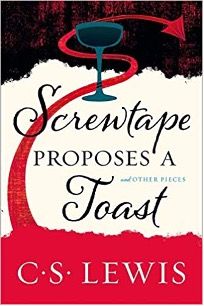C.S. Lewis is one of the greatest writers of the 20th century (at least in my opinion).
He is famous for writing the Chronicles of
Narnia, Mere Christianity, Surprised by Joy, The Great
Divorce, and many, many others. One of his most popular works is a short book
called The Screwtape Letters. The Letters were written by Lewis during
World War II and apparently, he did not think they were very good. The basic
theme of the book was that the senior tempter (Screwtape), a demon in the
bureaucracy of Hell, was writing letters to his nephew (Wormwood) on how to
tempt his "patient" and cause all kinds of trouble. Lewis covers many different areas of
temptation in the book and Screwtape advises many tactics for exploiting human
foibles and self-delusions. Unfortunately for Wormwood, he ultimately fails to
destroy his human and claim his soul for the bad guys; the patient is killed
and ultimately goes to Heaven, instead.
Screwtape Proposes a Toast was written almost 20
years later for the Saturday Evening Post and takes on the form of an
after-dinner speech given by Screwtape at the Tempter's Training College for
young demons. Most people consider this book to be a critique of the American
education system. Both books are wonderful reads and I hope you take the time
someday to enjoy them.

By now, I am sure you are wondering how I can possibly turn
this towards investing, portfolio management and, ultimately, banking. I'm going
to focus on one of his main points - and one of the most famous quotes in the
book. Remember, this is Screwtape speaking:
"No man who says I'm as good as you believes it. He would not say it if he did."
This quote made me think back to some of the worst meetings
I ever had with portfolio managers. When
I would discuss investments or investment strategies, the ultimate red flag was
someone saying almost that exact thing.
Often it took more of the form, "I don't need or want advice
- I'm a really good investor and I do things the way that I like to do them."
The contrast, of course, was the person who would say "Of
course I want to hear what you are thinking.
I may not agree with it, but if I might learn something, I am happy to
listen."
The idea of open discourse and debate is one of the
foundations of our company culture, and the more we have grown as an
organization, the more I understand that I know a little about a lot of things.
In some cases, very little, and if I try to represent that I am an
expert it will quickly become apparent that I actually am a fraud. Having said
that, there are some things that I do know a lot about and have studied in
detail for many years. When I hear someone say, "I don't need or want help." it exposes the speaker to
me, just as Screwtape suggested it would.
The contrast is really quite striking, because some of the
greatest investors I have ever met are those who actually know that they
desperately need advice on some topics—not all topics of course, because in
order to be great they have to have advanced knowledge on some topics—but they
are humble enough to seek experts on topics where they do not have expertise.
Think about that for a while…it's quite a paradox.
The contrast is really quite striking, because some of the greatest investors I have ever met are those who actually know that they desperately need advice on some topics—not all topics of course, because in order to be great they have to have advanced knowledge on some topics—but they are humble enough to seek experts on topics where they do not have expertise.
What's really cool about this is that I have met hundreds of
portfolio managers. I teach classes on investing, mortgage-backed securities,
and CMOs. I have also traded options for years. I know for a fact that there are
a lot of things about each of those topics that I do not know. Many of the
meetings I have had with individuals around the country have followed the
Screwtape pattern, where the person across the desk says they do not want or
need help…C.S. Lewis was right.
I started down this rhetorical path because, in all
frankness, I wanted to do a brag session on our firm and the several hundred of
our customers who attended our annual Advanced Course this year. The attendees
are professionals in their fields - running banks and credit unions of all
sizes - lenders - portfolio managers - CEOs and Directors. Yet these busy folks
all took three days out of their busy summer schedules to learn from experts in
areas where they were not as strong as they wanted to be. This kind of humble learner's attitude
flies in the face of what Screwtape wants to happen in our industry.
Of course, Screwtape wasn't really targeting the capital markets in his toast.
It turns out, the toast was actually meant as a warning to the U.S. specifically and democracy in general. Here are his steps (amongst others) to undermine the culture:
- Make sure that children never feel they are inferior. Self-esteem is the most important thing,
- Change curriculum to match the lowest level of student.
- Tie all the bright students to the lowest students.
= the virtual Abolition of Education
= the loss of innovation in science and culture
Remember, C.S. Lewis wrote this book in 1959!
Final, final thought: I'm pretty sure Topo Chico with a
twist of lime is the best sparkling water…but it's open for debate. Send me
your contenders.
Be sure to fill out the form below to subscribe to my weekly blog.


